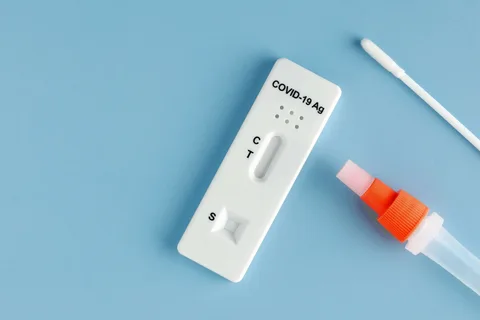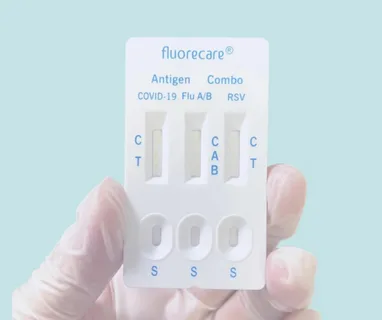In modern healthcare, Combination Test Kits have emerged as a beacon of innovation, offering streamlined diagnostics and comprehensive insights into various health conditions. These kits combine multiple diagnostic tests into a single package and have revolutionised how diseases are detected, managed, and treated.
The Significance of Test Kits in Modern Healthcare
In contemporary healthcare, the advent of Test Kits represents a significant leap forward. By amalgamating various diagnostic tests into a unified package, these innovative tools have transformed the disease detection, management, and treatment paradigm. Such an integrated approach to diagnostics enables healthcare professionals to glean a comprehensive spectrum of data from a solitary sample, markedly enhancing the efficiency of diagnostic and therapeutic protocols.
This holistic method of testing augments the precision of diagnostics and considerably diminishes the requisite time and resources for conducting multiple tests. Thus, Test Kits have emerged as pivotal instruments in the arsenal against diseases, empowering early detection and facilitating prompt intervention. Their role is increasingly critical in modern medical practices, illustrating their growing indispensability in enhancing patient care and healthcare outcomes.
Various Types of Test Kits and Their Applications
With their diverse applicability, Test Kits cater to a wide spectrum of healthcare needs, ranging from infectious disease screening to comprehensive metabolic analysis. The following bullet points elucidate some of the prevalent types of Test Kits and their respective applications in the medical field:
– Infectious Disease Kits:
Designed to simultaneously detect the presence of multiple pathogens, such as viruses (e.g., HIV, Hepatitis B and C) and bacteria, these kits are invaluable in the practical management and control of infectious diseases, especially in settings where co-infections are common.
– Sexually Transmitted Infections (STI) Panels:
These kits provide simultaneous testing for several STIs, including chlamydia, gonorrhoea, syphilis, and HIV, facilitating early detection and comprehensive treatment strategies.
– Respiratory Panels:
Capable of identifying a broad range of respiratory pathogens, including influenza viruses, respiratory syncytial virus (RSV), and streptococcus, these kits are crucial for the diagnosis and management of respiratory infections, particularly during seasonal outbreaks.
– Cardio-Metabolic Test Kits:
These kits measure a variety of markers related to cardiovascular health and metabolism, such as cholesterol levels, glucose, and triglycerides, assisting in the evaluation of heart disease risk and the management of diabetes.
– Cancer Screening Kits:
By assessing multiple biomarkers associated with different types of cancer, these kits aim to facilitate early detection and monitoring of oncological conditions, contributing significantly to patient prognosis and treatment outcomes.
Each type of combination test kit serves a unique purpose, underlining the versatility and potential of these diagnostic tools in addressing various health concerns.
 Advantages of Employing Test Kits in Diagnostics
Advantages of Employing Test Kits in Diagnostics
The use of Test Kits in the diagnostic process brings numerous advantages. These kits simplify the diagnostic journey for patients by consolidating the need for multiple sample collections into a single instance. This alleviates patient discomfort and significantly reduces the stress associated with undergoing numerous tests. From the healthcare delivery perspective, the integrated nature of these tests accelerates the provision of results. Such experience is pivotal in hastening the decision-making process, enabling the swift initiation of appropriate treatments.
Furthermore, the amalgamation of multiple diagnostics into a singular procedure presents an economic benefit, potentially leading to substantial cost savings. This is achieved through the optimised use of laboratory resources and the reduction of overall procedural costs, benefitting both healthcare establishments and patients. Thus, Test Kits stand out as a remarkable advancement, streamlining diagnostics and enhancing the efficiency and effectiveness of healthcare services.
Challenges Faced in the Development and Use of Test Kits
The journey towards developing and deploying Test Kits has numerous obstacles. Among the foremost concerns is maintaining the precision and reliability of each constituent test. The interplay of different assays within a single kit necessitates meticulous validation to ensure that the integrity of one test does not inadvertently compromise another.
Navigating the regulatory landscape presents another hurdle, as the comprehensive nature of these kits demands more rigorous scrutiny than standalone diagnostic tests. Additionally, the complexity of interpreting results from such kits requires heightened expertise, which may only be readily available in some healthcare settings.
This limitation underscores a critical challenge, potentially restricting the utilisation of Test Kits to facilities with the necessary specialist knowledge. This scenario highlights the need for enhanced training and support systems to maximise the benefits of these diagnostic tools across a wider range of healthcare environments.
The Impact of Technological Advances on Test Kits
Technological advancements have been pivotal in enhancing the efficacy and scope of Test Kits. Innovations in fields such as molecular biology have led to the development of more sensitive assays that can detect diseases at earlier stages with greater accuracy. Microfluidics technology has enabled the miniaturisation of these tests, allowing for integrating multiple assays into compact formats suitable for a wider array of settings, from clinical laboratories to remote areas lacking extensive healthcare infrastructure.
Bioinformatics plays a crucial role in interpreting the complex data generated by these kits, utilising sophisticated algorithms to decipher results quickly and accurately. These technological leaps have made Test Kits more user-friendly and expanded their applicability, paving the way for their use in point-of-care scenarios and even in patients’ homes.
As such, technological progress continues to push the boundaries of what is possible within diagnostic testing, significantly broadening the utility and reach of Test Kits in the healthcare domain.
Ethical Considerations in the Use of Test Kits
Employing Test Kits introduces significant ethical dimensions that necessitate careful navigation. Among these, patient consent emerges as paramount, especially in tests revealing genetic predispositions and unforeseen health conditions. The holistic approach of these kits means they can unearth unexpected results, presenting a challenge in ensuring that patients are fully informed about the potential scope and implications of the tests they undergo.
Additionally, safeguarding patient data assumes heightened importance, given the comprehensive nature of the information these tests can generate. Robust protocols must be established to protect this sensitive data from unauthorised access, ensuring it is used solely for the intended diagnostic purposes. These ethical concerns underscore the necessity for transparent communication strategies and stringent data protection measures to use Test Kits to uphold the principles of patient autonomy and privacy.
The Future of Test Kits in Medical Diagnostics
The horizon for Test Kits within medical diagnostics has potential, thanks to ongoing research and technological advancements. These developments are anticipated to broaden these kits’ accuracy and application range significantly. With an eye towards a future where diagnostics become increasingly personalised, the expectation is that Test Kits will be customised to align with individual genetic markers, lifestyle influences, and distinct health queries.
This tailored approach promises to refine patient care further, ushering in a new era of diagnostics that anticipates the requirements of individual patients and addresses them with unprecedented precision. Moreover, the integration of cutting-edge technologies and novel biomarkers is set to enhance the sensitivity and specificity of these kits, enabling the detection of diseases at their nascent stages.
Current Trends in Combination Test Kit Development
In the evolving landscape of combination test kit development, there is a concerted focus on enhancing the specificity and sensitivity of these diagnostic tools whilst simultaneously striving to reduce production costs and extend their reach. Innovators are increasingly exploring non-invasive sampling methods, such as assays based on saliva or breath samples, to circumvent the discomfort associated with traditional sampling techniques and improve patient compliance.
Integrating digital technology is another prominent trend, with developers incorporating smart features into test kits to simplify interpreting complex data and facilitate efficient sharing between patients, healthcare practitioners, and diagnostic laboratories. These advancements aim to foster a more interconnected healthcare environment where diagnostics are not only more accessible but also more intuitive to use.
By focusing on these key areas, the development of Test Kits is set to redefine diagnostic practices, making them more patient-friendly and integrated into the fabric of modern healthcare systems.
Improving Patient Outcomes through the Use of Combination Test Kits
The deployment of combination test kits significantly bolsters patient outcomes by ensuring rapid and accurate diagnoses, which is pivotal for timely therapeutic interventions. These innovative diagnostic tools amalgamate various tests, providing a holistic overview of a patient’s health status from a single sample.
This approach expedites the diagnostic process and minimises the discomfort and inconvenience for patients, often associated with multiple tests. Enhanced diagnostic efficiency facilitates the early identification of diseases, thereby allowing healthcare providers to devise and implement personalised treatment strategies more swiftly. Such customised care plans are instrumental in addressing the unique health profiles of individuals, improving their chances of recovery and long-term management of conditions.
Additionally, by enabling the detection of multiple conditions simultaneously, these kits ensure that no underlying health issue goes unnoticed, further safeguarding patient health. This capacity to deliver comprehensive, accurate, and prompt diagnostic results underscores the transformative potential of Test Kits in elevating the standards of patient care, making them an indispensable asset in the contemporary healthcare landscape.
Potential Impact of Test Kits on Public Health
On a grander scale, introducing Test Kits into the public health domain could herald substantial benefits. These kits stand poised to transform outbreak management and epidemiological surveillance, affording rapid, wide-ranging insights into disease transmission and mutation dynamics.
By facilitating comprehensive and swift diagnostics for prevalent conditions, such as infectious diseases and non-communicable illnesses, they underpin public health strategies aimed at prevention, early detection, and timely intervention. This capability is particularly critical in the containment of infectious outbreaks, where the ability to identify and respond to emerging threats swiftly can significantly alter the course of public health crises.
Moreover, applying these kits in routine health screenings contributes to the early diagnosis of chronic conditions, thereby supporting efforts to mitigate the long-term impact of such diseases on communities. The broad adoption of Test Kits could, therefore, play an instrumental role in reducing the overall burden of diseases on populations, marking a stride towards more proactive and preventive healthcare approaches that emphasise early intervention and comprehensive disease surveillance.
FAQ’s
– What constitutes a combination test kit, and how does it function?
A combination test kit encompasses various diagnostic assessments consolidated into one package, allowing simultaneous testing for multiple conditions or markers from a single patient sample. It integrates different diagnostic technologies tailored to detect specific health indicators efficiently.
– Who benefits from the utilisation of Test Kits?
Both healthcare professionals and patients stand to gain from the use of these kits. Healthcare providers can achieve a comprehensive diagnostic overview more swiftly, aiding in informed decision-making, whilst patients experience reduced discomfort and inconvenience associated with multiple testing procedures.
– Are combination test kits applicable in all healthcare settings?
Whilst advantageous, deploying combination test kits may necessitate specific infrastructure and expertise, limiting their use primarily to facilities that can support the requisite technological and professional requirements.
– How reliable are the results from Test Kits?
The reliability hinges on rigorous validation processes ensuring that each kit component maintains its accuracy and specificity. However, outcomes may vary across different brands and types of kits, underlining the importance of adherence to stringent quality control measures.
– Can Test Kits detect new or emerging diseases?
Yes, with ongoing advancements in diagnostic technology, Test Kits are increasingly capable of being adapted or developed to include assays for novel pathogens, playing a crucial role in the surveillance and management of emerging infectious diseases.
Conclusion
In summary, combination test kits represent a pivotal advancement in medical diagnostics, blending efficiency with comprehensive insight. Their evolving role within healthcare is underscored by the capacity to revolutionise patient care, enabling early detection and facilitating personalised treatment strategies. Despite challenges in development and deployment, the potential benefits of improved patient outcomes and public health are profound.
| Related Business Listings |
| Contact Directory |
| Local Business Profiles |

